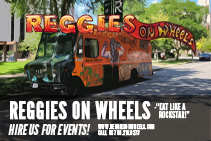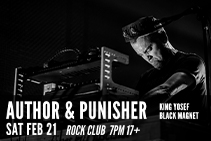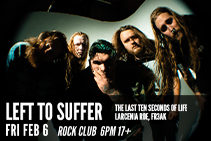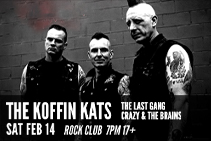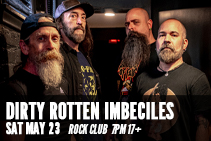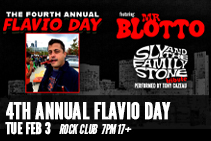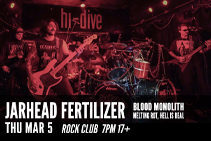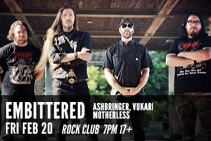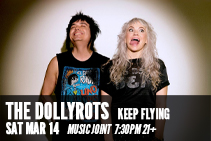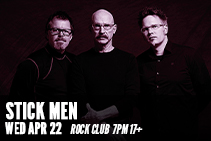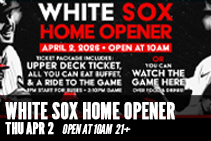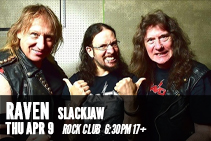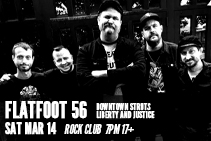
KENTUCKY KNIFE FIGHT
As the Gateway to the West, the promise of leaving St. Louis was built into the prospect of arriving here; her arch functions as an ironic symbol of something to pass through, that which you don’t look at but look beyond. But for those who stay, like the five-piece punk-blues wrecking crew Kentucky Knife Fight, this unswept city itself finds a voice in their sound. Like the dark side of a postcard, unfamiliar unless you live there, their newest songs are inhabited by the city’s criminals and carrion – its lonely, displaced, and desperate. Their city is poised on the precarious edge between southern hospitality and northern cynicism, between bourbon in a pitcher and lukewarm beers that you have to open yourself.
Kentucky Knife Fight have grown along with the city, returning after relentless touring with an increasingly acute perspective of the hardships inherent in St. Louis life. Like the scene itself, they have seen their own youthful angst become introspection and insight; what were once accidental riffs have become anthems; and opening for national acts have yielded performances that were not only memorable, but mattered. Their music is world-weary but hopeful; grace is never enough to save the unsavory; and just because you love something doesn’t mean that it’s good for you.
Pulling St. Louis with them like an always-almost-broke-down trailer across the country, the band is but one of a growing armada of ambassadors in every medium, renewing the city’s vital voice in American art. As it has nurtured its native son Pokey LaFarge, who can be heard on Jack White’s newest record, the city’s community-based initiatives, collective spaces, and galleries are fostering progressive ways to imagine performance-based art. Newly influential again, St. Louis is listening to Kentucky Knife Fight tell its story; they were named “Best Rock Band” twice by the Riverfront Times, but that feels less like an award than an announcement. Because Kentucky Knife Fight are too hungry to be tired; too restless to rest; and too stubborn to stop.
Kentucky Knife Fight is…
Jason Holler – vocals
Curt Brewer – guitar
Nate Jones – guitar
Jason Koenig – bass
James Baker – drums
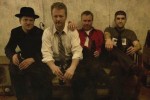
THE GREAT CRUSADES
It’s not hard to believe that The Great Crusades have been a band for more than 10 years and have seven albums to their name as well as a career retrospective DVD (Key to the City). The band members’ friendships lie at the heart of why The Great Crusades is still a viable, prolific band in 2010. On the other hand, some might say the band is still together only because it took this long to make its best album yet, Fiction to Shame.
Regardless, the personal history of the band is at least partly responsible for its longevity. Although The Great Crusades was formed in Champaign, Illinois, by vocalist/guitarist Brian Krumm in 1996, the current lineup of the band has been together since 1998. The band members have also known each other most of their lives at this point.
Krumm, bassist Brian Hunt, and drummer Christian Moder went to grade school and high school (and played in bands together) in the St. Louis suburb of Collinsville, Illinois. Hunt and Krumm met Brian Leach, guitarist/keyboardist/vocalist, in 1989 in Champaign. Somehow, all four band members ended up in Chicago in 1998, and they’ve managed to stay together and make great music together to this day.
The first Great Crusades album, The First Spilled Drink of the Evening, was released by Mud Records in 1997, and its sound and lyrics quickly created a cult following for the band. Rolling Stone’s David Fricke wrote, “The Great Crusades look at life through a shot-glass lens…mixing anger, muscle, and minor-key remorse like a roughneck Tindersticks with the bonus of a singer (Krumm) who’s got the tubercular pipes of Tom Waits and Axl Rose’s love child.” The album was reissued in Europe in 1998 by the German indie Trocadero Records, and the first of many European tours followed.
Damaged Goods was released by the venerated German label, Glitterhouse Records, in 2000, and by Checkered Past Records in the U.S. The critical accolades kept coming with praise from European and American press alike. Never Go Home (2002) earned 4 stars from Rolling Stone (Germany) and saw the band reach a higher public profile when a tour of Germany, Austria, and Croatia was presented by Musikexpress magazine. In 2003, the band gained even more exposure as part of their appearance on the celebrated German television program, Rockpalast.
Welcome to the Hiawatha Inn (2004), Four Thirty (2006), and Keep Them Entertained (2007) followed, each featuring a fresh approach to the band’s sound. The band continued to expand its fan base and further build its reputation as one of the most engaging, wildest live bands in the business. Along the way, the band shared the stage with a very diverse list of artists, including Gary Moore, Scorpions, 16 Horsepower, Broken Social Scene, Bottle Rockets, Steve Wynn, and Leningrad Cowboys.
Now, with Fiction to Shame, the band is poised to introduce yet another creative direction to its dedicated following. Written and recorded live simultaneously, this album includes some of the band’s most unique-sounding yet accessible songs to this point. Most importantly, however, at the heart of the record lies the sound of four great, lifelong friends making music together as they have for more than a decade.
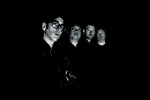
WES HOLLYWOOD
Wes Hollywood is at once a modern craftsman and a retro stylist, a purveyor of vintage rock songcraft. Wes has been a staple in independent music for more than a decade, first with The Wes Hollywood Show and then with a couple of well-received platters as tenniscourts. The name has changed, but the sound has remained a constant – two parts delirious Kinks melodicism mixed with one part Cheap Trick whipcrack, a splash of harmony and a bracing dash of fashion. This potent brew has never sounded better.
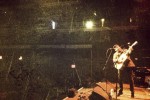
BRYAN MCPHERSON
In 2012 Bryan released the critically-acclaimed album American Boy / American Girl on State Line Records. He then launched a successful Kickstarter campaign for a reliable tour vehicle and embarked on an extensive national tour, sleeping mostly in his van in the parking lots of oppressive department stores, and singing his gospel for the masses. He has performed alongside Amanda Palmer and Michael Moore at
the Occupy Oakland Encampment, with Steve Earle in San Francisco for Litquake’s Woody Guthrie Tribute Show, and appeared at an exclusive show in East London, playing to a capacity audience. He has been featured in The Huffington Post, The Boston Phoenix, Dig Boston, and The San Francisco Bay Guardian. He currently resides in Los Angeles, California.
The following article appeared in The Boston Phoenix in April of 2012. By Barry Thompson
There’s no shame in baring your soul for the pleasant old folkees who haunt open mic nights at your favorite independent coffee shop. So, no offense to singer/songwriters who present their folk in that genre’s traditional contexts — but, should the opportunity arise, those people should all try playing a club packed with tattooed toughs who’ve just been prompted, by an Agnostic Front side project, to jubilantly punch each other in the face for 40 minutes.
The first time he knocked my socks off, Bryan McPherson contended with precisely these conditions on a 2009 bill headlined by Street Dogs at the Paradise. And he’d later go on tour with the Dropkick Murphys, including gigs in Boston during St. Patrick’s Day week. By the time emulating Billy Bragg became fashionable, or anybody was self-applying the phrase “riot-folk,” the Dorchester-bred songsmith was an old hand at being the token folk guy playing the punk-rock show.
“Remember ska-punk? Same deal,” he says via phone, when asked about all the folk-punk bands that have been running around for a few years. Even coming from an artist who’s lumped into a notably unpretentious genre, that’s some impressive “cut the bullshit” candor. Then again, as the unfussy ballad of nuclear revenge he titled “Me, I Am Anger” reminds us, you can’t truly wear your heart on your sleeve while keeping its black spots hidden. A Boston release show for McPherson’s first album in five years, American Boy/American Girl(State Line), goes down tonight (Thursday) at T.T.’s in Cambridge.
Half a decade seems like a long time between albums, but something in McPherson’s head clicked once he soaked up a change of scenery. Not that there’s any “sunshine and surfin’ ” Best Coast–type shit on American, but his mostly for-the-fuck-of-it relocation from Boston to Berkeley 18 months ago provided an overdue muse.
“There are a couple of tunes on there about being somewhere where you don’t know too many people, and the experiences of going west: putting your shit out on a curb, getting on a plane, and ending up there,” he says, mid-jaunt somewhere in the vicinity of the mythic Oakland punk club 924 Gilman. “Sometimes you’ve got to wait for the right songs to come together to put something out.”
But as can be expected from someone who spends a lot of time at Occupy encampments, disgust with our generally shitty national condition inspired several of American’s trembling narratives. A forlorn harmonica heralds “Dangerous Friends,” a catchy-as-hell remembrance of Southie crime bosses and their murderous shenanigans. A jostling ditty called “Black Man” lists dilemmas that are routinely incurred by basically anyone who isn’t white, male, and unwaveringly heterosexual. The 2009 murder of Oscar Grant in Oakland provoked McPherson to pen
“I See a Flag.” Grant, unarmed and pinned to the ground at the time, was shot in the back by a public transportation police officer. “They said it was an accident, I guess,” muses McPherson. “If I shot a cop by accident, I think I’d be in jail for a very long time.”

